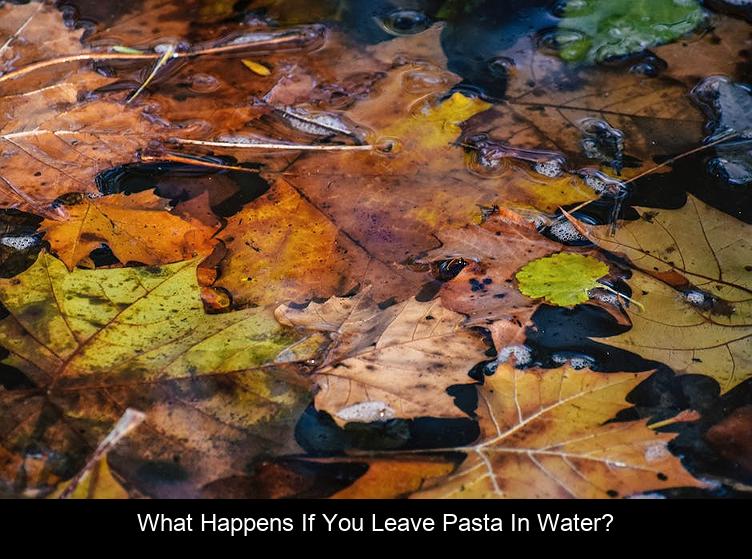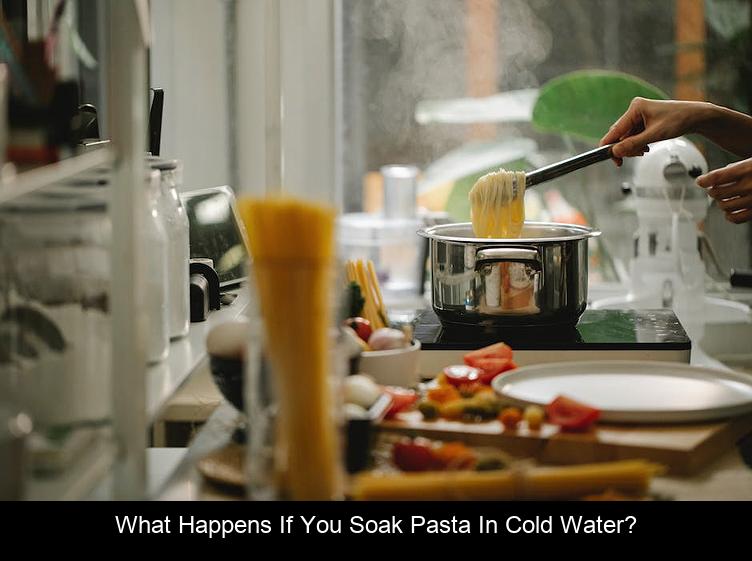If you soak the day before you’re going to cook pasta, you’ll end up with a cooked, thankyouful mess. All of the goodness that was set in front of you just isn’t worth the off-putting sensation when you’re trying to eat it. If you know what I’m going to say, it won’t be a problem. Soaking the day before is like adding an extra step to the process of cooking pasta, and it’s a good idea to do so, especially if you’re using a pasta maker.
The good news is that you can do most of the above and still have the pasta turn out cooked. The bad news is that if you soake the day, you’ll probably have to cook the pasta anyways. I’m not saying that I don’t like cooked pasta, I’m just saying that I wouldn’t recommend soakin’ the day before cooking.
Can you soak dry pasta?
Dry spaghetti is rehydrated in about ten minutes in boiling water, and in around two hours in room-temperature water, so you can soak your spaghetti for a couple of hours to complete the first half of the process without using energy to boil water.
Can you soak pasta before cooking?
Pasta Cooking Method: Soak and Cook for One Minute
Soak the pasta strands for 90 minutes to give the noodles time to absorb the moisture without activating the starches.
Bring water to a boil and cook the soaked noodles for 1 to 2 minutes.
Can you cold soak noodles?
The only pasta type that is ideal for cold soakering on the trail is instant or precooked pasta. frequently couscous, ramen, or other instant pasta are all ideal for this purpose.
What happens if you put pasta in before water boils?
Science of Boiling Water:
Pasta added to water before it starts to boil gets a heat start on mushiness. You need the intense heat of boiling water to set the outside of the pasta, which prevents the pasta from sticking together.
Does soaking pasta reduce cooking time?
Alexander Talbot of Ideas in Food discovered that soaking pasta in cold water for 90 minutes significantly cut down on cooking time. In order to become fully cooked, pasta needs to absorb water to become fully pliable, while heat activates the starch and helps it to become more gel-like.
What happens if you leave pasta in water?
Don’t leave pasta in water after it’s done cooking. If you make more noodles than you can eat, toss them with sauce for 2-3 minutes over medium heat in a frying pan.

Should you soak noodles?
The noodles should be soaked in hot water for 5 to 15 minutes, just until tender. If adding to a soup, it is not necessary to soak the noodles before adding them. Do not soak if you are deep-frying the noodles.
How do you soften pasta without boiling it?
One is to run cold water over the cooked pasta and either drain it or set a colander in the sink for about 5 minutes. The other is to cover with water, add about 1 tablespoon of salt, let it sit for 8-10 minutes.
Does orzo absorb water?
The simplest way to prepare orzo is to boil it in a pot of salted water and drain it as you would any other pasta. It cooks to al dente in about 8 to 10 minutes, but most of the water is absorbed.
What happens if you soak pasta in cold water?
Because starch needs to be heated to gel properly, soaking pasta in cold water will allow you to hydrate it without worrying about it sticking together. Once it\u0092s fully hydrated, you\u0092ve just got to finish it off in your sauce and you\u0092re ready to serve.

How long would it take to cook pasta in cold water?
This process typically takes around 8-10 minutes, depending upon the type of pasta you are cooking. If you simply soak it in water, eventually water will be absorbed, but not in 8-10 minutes. Just for fun, I took a couple of pieces of penne and threw them into cold water. It has been three hours.
Can you start cooking pasta in cold water?
You can’t cook pasta in cold water. But you can put pasta in a pot, cover it with cold water, and then boil it. In fact, if you do that, the pasta will turn out perfectly and you just might cook it that way all the time.
Do you put pasta in cold or hot water?
The pasta should be swimming in a sea of water because it will expand while cooking. Hot water dissolves pollutants more quickly than cold, and some pipes contain lead that can leak into the water. Just to be safe, always use cold water from the tap and run the water for a little before using.
Why do you cook pasta uncovered?
Adding the pasta will bring the water to a boil, and then boiling time will be used to bring the pasta to a boil again. Once the pasta is boiled over, it is recommended that you place the lid on and let the water come back up to a boil. If the pasta is given a Foam up! warning, it is best to place the lid on and let the water come back up to a boil.
How much water do you need for no Drain pasta?
Pour enough water over spaghetti to barely cover, about 2 3/4 cups. Turn heat to medium and cook about 15 minutes until pasta is nearly al dente, stirring frequently to keep pasta from sticking together. About 1/2-inch of liquid should remain.

Hello there! My name is Tristram Ortega and I am a professional chef with a passion for cooking. I work at a top-rated restaurant where I create delicious dishes every day, and I’m excited to share my tips and techniques with you. Through this blog, I share my favorite recipes, cooking hacks, and insights into the world of professional cooking. So let’s get cooking together!